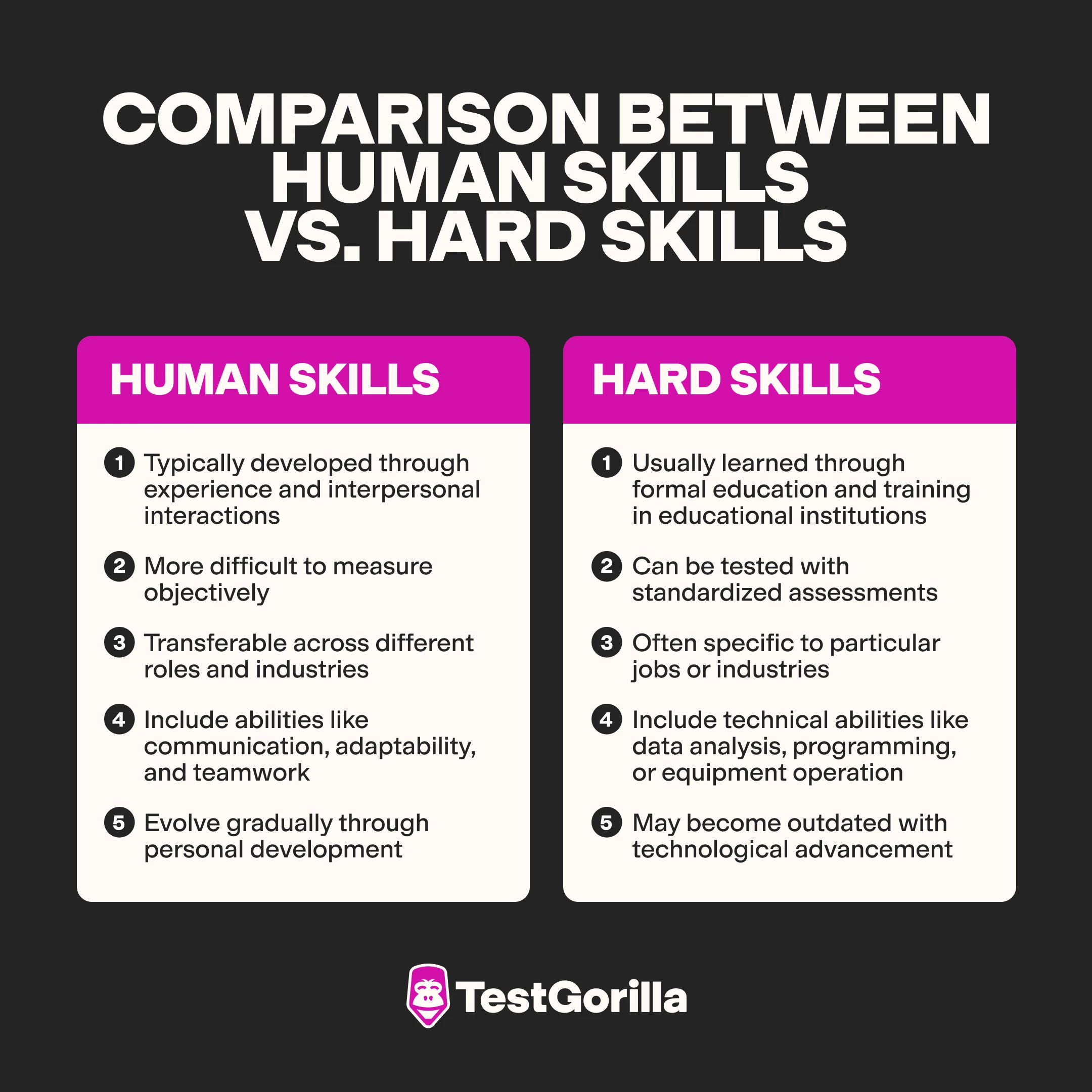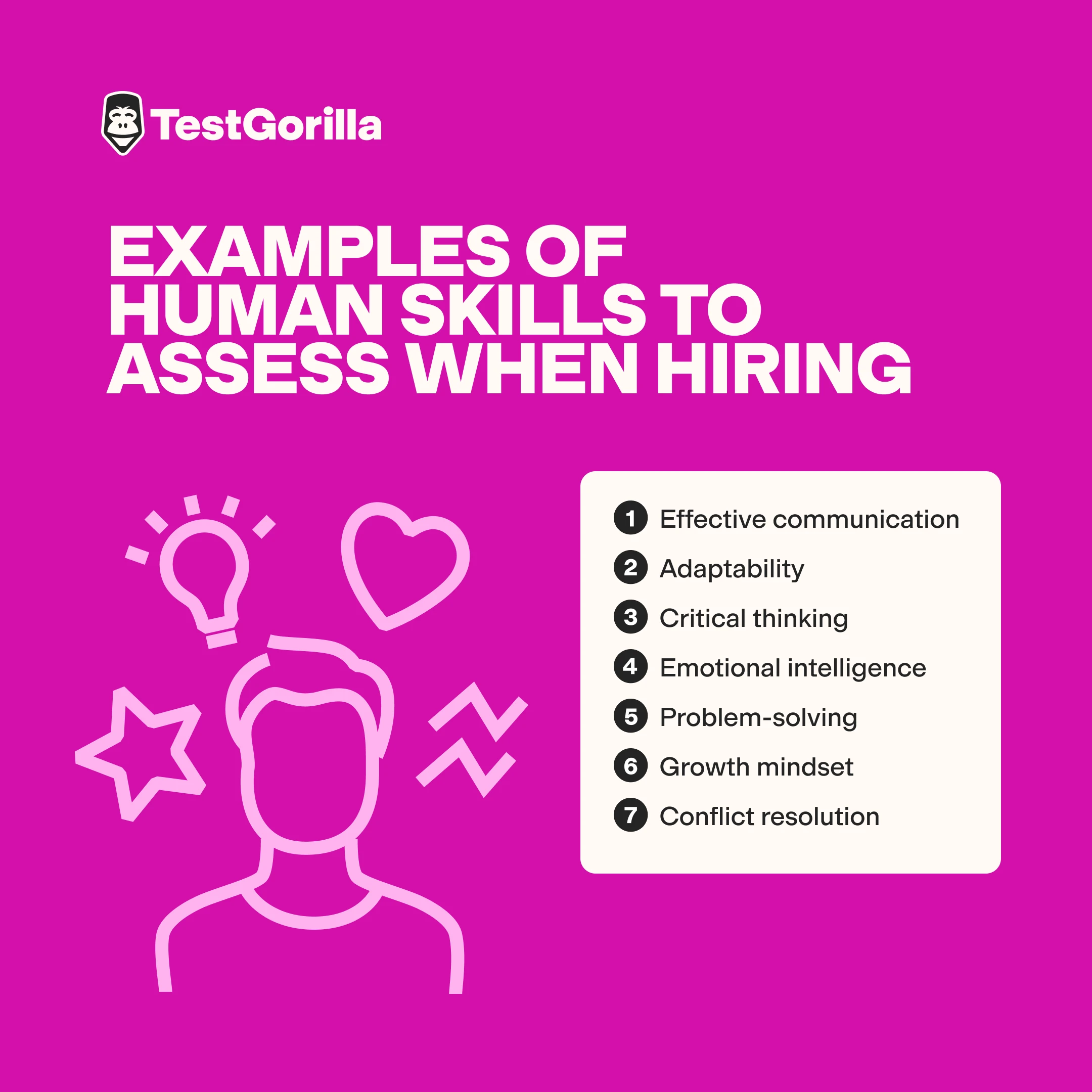Great employees do more than just know their job – they communicate well, work with others, and handle change easily. These soft skills help teams run smoothly.
However, when hiring focuses only on technical abilities, things can fall apart. Think: misaligned teams, missed deadlines, and new hires who don’t stick around. The missing piece? Essential non-technical skills, aka human skills.
So, why do these skills matter, and how can you spot them when hiring? This guide breaks it all down with clear ways to identify the human skills that matter most.
What are human skills?
Human skills are the everyday abilities that help people work well with others, solve problems, handle stress, and adapt to change.
You might hear them called soft skills or social skills – but “human skills” better reflect how essential they are to success at work, especially in roles that require strong leadership skills.
Unlike technical or digital skills, which can become outdated as tools and technology change, human skills stay relevant regardless of role or industry. That’s why prioritizing human skills development helps build teams that communicate clearly, adapt quickly, and collaborate effectively.
Human skills vs. hard skills
Hard skills are measurable, teachable abilities acquired through training or experience, essential for specific tasks or roles. Examples include coding, accounting, or operating machinery. In contrast, human skills are more universal and transferable across different roles and industries.
Here's a quick comparison:
Human skills | Hard skills |
Typically developed through experience and interpersonal interactions | Usually learned through formal education and training in educational institutions |
More difficult to measure objectively | Can be tested with standardized assessments |
Transferable across different roles and industries | Often specific to particular jobs or industries |
Include abilities like communication, adaptability, and teamwork | Include technical abilities like data analysis, programming, or equipment operation |
Evolve gradually through personal development | May become outdated with technological advancement |
Looking to go beyond the basics? Explore underrated soft skills and their impact within the workplace.
The best insights on HR and recruitment, delivered to your inbox.
Biweekly updates. No spam. Unsubscribe any time.
Why are human skills in the workplace so important?
Here’s why human skills matter more than ever:
They make teamwork actually work. Clear communication, fair conflict resolution, and idea-sharing keep projects on track. Without them, even great work can fall apart.
Robots can't do them (yet). Empathy, ethical thinking, and creativity are still human-only strengths – and they’ll only matter more as tech advances.
They help people roll with the punches. Change is constant. Employees with a growth mindset adapt quickly and keep things moving.
They make better bosses. Great managers lead with empathy, handle conflict well, and bring out the best in their teams – not just follow the rulebook.
They build strong relationships. Employees who connect well with colleagues and clients create a positive work environment that boosts retention and productivity.
7 human skills to look out for
When you're sizing up job candidates, keep an eye out for these key interpersonal skills that make the difference between an okay hire and a great one.
1. Effective communication
Good communication is about clearly getting your point across and listening to others. Strong communicators adjust how they speak depending on who they’re talking to, provide helpful feedback, and clear up confusion before it becomes a problem.
They give direct answers, ask thoughtful questions, and explain complex topics in a way that’s easy to understand – without sounding condescending. These skills are especially important in customer service.
How to spot: Ask them to explain a technical part of their past role as if you're new to it. Watch if they check in as they go, adjust based on your reactions, and avoid unnecessary jargon.
Not sure what to ask? Read our guide on interview questions to assess candidates' communication skills.
2. Adaptability
Adaptability means staying calm and flexible when things don’t go as planned. It’s about handling last-minute changes, learning new tools quickly, and shifting priorities without getting thrown off.
Adaptable people treat change as part of the job. They often share stories of adjusting to new managers, shifting goals, or learning unexpected skills on the fly.
How to spot: Ask about a time their work plans got turned upside down. People who struggle with change may focus on frustration. Adaptable candidates will explain how they adjusted – and what they learned from it.
3. Critical thinking
Critical thinking means not taking things at face value. It’s the ability to notice when something doesn’t add up and to dig deeper instead of blindly following instructions.
Strong critical thinkers ask “why,” explore problems from different angles, and make decisions based on facts – not just gut feelings.
They question assumptions others miss
They anticipate issues before they happen
They connect patterns others might overlook
They separate facts from opinions when making decisions
How to spot: Give them a scenario with missing info. For example: “Our team needs to launch a new product, but we’re unsure if we should prioritize speed or extra features.” Good critical thinkers will ask what details are missing before making a decision.
For more questions, read our guide on critical thinking interview questions.
4. Emotional intelligence
Emotional intelligence (EI) means being aware of your own emotions, understanding how others feel, and showing empathy. As Mary Nen, Chief Talent Officer, puts it:
"Authority without empathy is just bossy. Emotional intelligence is the real power move – listen actively, stay composed under pressure, and recognize what your team needs before they say it. When people feel heard and valued, they step up."
People with strong EI can sense when a teammate is struggling and manage their own stress without letting it spill onto others.
They talk about conflicts without blame, take responsibility for their part, and demonstrate seeing things from different perspectives – even when they don’t agree.
How to spot: Ask about a time they got tough feedback. Low-EI candidates may get defensive or shift blame. High-EI candidates will share how they felt, what they learned, and how they used the feedback to grow.
5. Problem-solving
Problem-solving is about finding practical ways through messy situations. It’s not just about knowing the “right” answer – it’s about working through challenges when there’s no clear guide.
Strong problem-solvers stay focused under pressure. They break problems down step by step and look for solutions that actually work, not just sound good in theory.
They define success before diving into solutions
They think about time, budget, and other limits
They try different approaches if the first one doesn’t work
They learn from mistakes and adjust as needed
How to spot: Ask about a time they faced a difficult problem with no clear solution. Listen for how they found the real issue (not just the symptoms), what steps they took, and how they knew their fix worked.
For more questions, read our guide on problem-solving interview questions.
6. Growth mindset
A growth mindset means believing you can improve through effort and continuous learning. People with this mindset see challenges as chances to grow, not threats to their confidence. They enjoy learning, bounce back from setbacks, and seek feedback to get better – not just to hear praise.
How to spot: Ask about something they weren’t good at but improved over time. Look for details on how they learned, what steps they took, and how they handled obstacles.
For example: “I used to struggle with presentations. I joined Toastmasters, recorded myself, and asked for feedback after each one. Now, it’s something I actually enjoy and do well.”
7. Conflict resolution
Conflict resolution is about handling disagreements in a way that makes things better – not worse. It’s an essential skill in any workplace where people need to collaborate.
Great conflict resolvers stay calm under pressure. They can disagree without getting personal and aim for outcomes that work for everyone – not just winning the argument.
How to spot: Ask about a time they had a serious disagreement at work. Be cautious if they say they’ve never had conflict or only talk about “winning.” Strong answers show how they resolved the issue while keeping relationships intact.
Need ideas? Head over to our conflict resolution interview questions.
Identify human skills in a candidate with the right tests
The modern workplace has changed. While technical skills still matter, it’s human skills – like communication, adaptability, and teamwork – that truly set great teams apart. These aren't just nice-to-have traits – they're essential for thriving in today’s fast-paced, collaborative environments.
That’s why it’s so important to know how to spot them when hiring. Resumes and interviews alone don’t always tell the full story. Candidates rehearse answers, and bias – unintentional or not – can get in the way.
The smartest hiring managers take a balanced approach using soft skills interview questions and objective skills evaluations. These include:
Human skills tests for communication, teamwork, and adaptability
Personality tests to understand workplace behavior
Situational judgment tests to see how candidates handle real-world challenges
Role-specific tests to confirm job knowledge
This combination gives you a more accurate, well-rounded view of each candidate – before you make a costly hiring decision.
TestGorilla offers specialized tests that help you identify the human skills your organization needs most. Consider incorporating the following into a holistic skills assessment:
Communication test
Critical Thinking test
Leadership and People Management test
Problem Solving test
Time Management test
Attention to Detail test
Culture Add test
These tests complement our comprehensive list of soft skills and practical soft skills assessment tools to give you a complete picture of candidates.
Get started with TestGorilla for free today by registering for an account.
You've scrolled this far
Why not try TestGorilla for free, and see what happens when you put skills first.
















